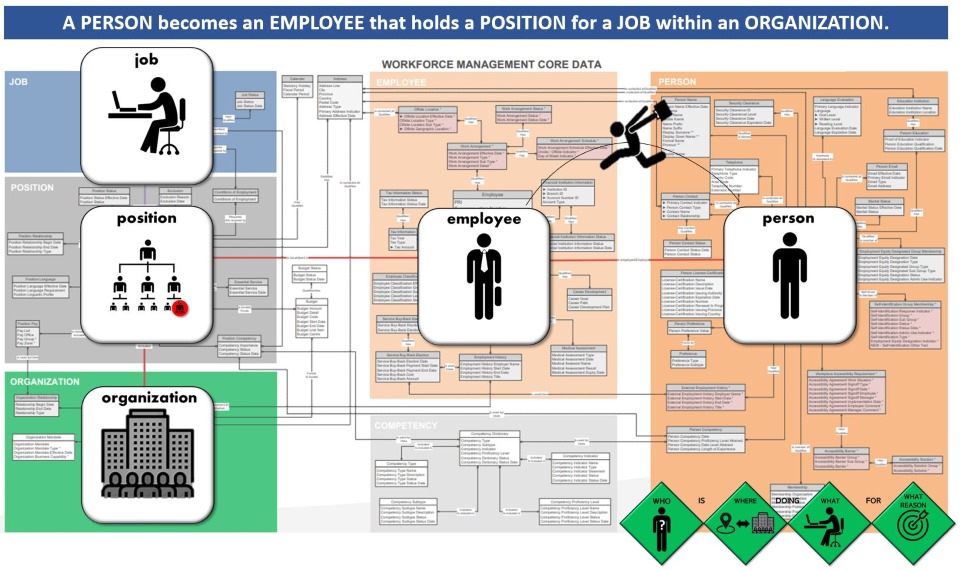HR Council Newsletter
A Collective Voice, A Collective Purpose: HR Excellence

In This Edition:
- A Candid Q&A with the President of the Public Service Commission
- Artificial Intelligence à la HR: Maximizing Efficiency While Minimizing Risk
- HR Community Development Updates
- Apply today! Experienced Former HR Professional Inventory
- Launch of the Revised Informal Conflict Management Interdepartmental Standardized Job Descriptions
- NEW Tool: The HR Functions Handbook
- The First “helloHR” Speed Mentoring Event Was a Hit!
- New Additions to the HR Learning Lounge and HR Resources Centre
- HR Community Managers’ Corner
- Community of Practice Spotlight: Interdepartmental Equity and Diversity Network
- What’s New?
- Did You Know?
- What’s Upcoming?
- Contact Us
- Subscribe
A Candid Q&A with the President of the Public Service Commission

The Human Resources Council (HRC) was honoured to connect with Marie-Chantal Girard, who is now almost three months into her current role as President of the Public Service Commission (PSC). She was appointed on January 2, 2024, having previously served as Senior Assistant Deputy Minister, Employee Relations and Total Compensation, at the Treasury Board Secretariat of Canada since June 2021. Read on to learn about President Girard’s professional journey, the lessons she’s learned along the way and how she finds balance with her personal life.
What previous experiences prepared you to take on the role of the President of the PSC?
When I began my career, I was a young, unilingual graduate. Unemployment was high, and precarious employment was almost guaranteed.
For 7 years, I worked as a lobbyist in a community organization to improve women’s access to the labour market. At the same time, I was pursuing my doctoral studies, which involved analyzing the obstacles that young people were facing when entering the workforce and developing better strategies to help them.
I then joined the federal public service to work from within, with the intention of contributing to a diversity of perspectives. At Human Resources Development Canada and the National Secretariat on Homelessness, I focused mainly on issues related to income security and socio-economic development. These experiences gave me a great appreciation for the lived realities of people facing barriers to full participation.
Over the course of my career, I’ve taken on a variety of roles that helped me to develop a regional, national and international perspective.
One key experience was my time as Canada’s representative and Chair of the Organisation for Economic Co-operation and Development’s Regional Development Policy Committee, where I drew on my years of work on labour market development and advocacy in the community and para-public sectors.
I also benefitted as I learned to lead and navigate in increasingly complex horizontal contexts. As Assistant Deputy Minister for the Pensions and Benefits Sector at the Office of the Chief Human Resources Officer, as well as in various senior management positions at Canada Economic Development for Quebec Regions and the Quebec Federal Council, I learned through liaising and coordinating horizontally with the federal community.
For the past few years, as Senior Assistant Deputy Minister of Employee Relations and Total Compensation at the Office of the Chief Human Resources Officer / Treasury Board Secretariat, I led the creation and implementation of a total compensation approach aimed at attracting and retaining the most diverse talent. This approach is built on pillars such as the modernization of working conditions, the viability of pension and benefits plans, and the implementation of the Pay Equity Act. This was no small task. It taught me a great deal about working collaboratively with multiple stakeholders on topics that touch deeply held values.
What advice do you wish someone had given you when you first started your career in the public service?
An important piece of advice that I would advise everyone joining the public service to do, would be to become fluent in both official languages as early as possible in their career. Bilingualism is incredibly important. It is part of the foundational agreement of our country, and it is a visible aspect of our diversity and of our respect for and understanding of one another. Like most investments, it works better if built up early. Practice makes perfect! And you make wonderful friends along the way as you learn not only a language but a culture as well.
I would also encourage every new public servant to deliberately start building their own personal change management toolkit. Take advantage of the training opportunities in this area and seek out mentors. Change is a constant. Those who can successfully navigate it are always in demand.
Another one that can sound surprising, but that I believe in, is to say yes by default. That doesn’t mean saying yes to every request, of course. What I mean is keeping a curious and positive outlook, being solution oriented and always seeking a way forward. Being known as a person who likes to find a way means people will think of you when a challenging opportunity arises. Be open to taking some risks, because without risk there is no innovation and reward. It’s a big world, and sometimes taking the leap is the best way to reach a new height.
One last piece of advice would be to cherish and nourish your networks. Networking is key to building long-term professional success. Make sure to work with people you don’t know and reach across to valued colleagues who are now in another area. This is a practice which takes time and energy but yields enormous benefits.
Over the course of your esteemed career, what has “work-life balance” come to mean for you?
Ensuring that I keep a healthy work-life balance has always been important to me, but it came to have a different meaning throughout my career. But I should from the get-go mention that I think one should tread carefully when using that expression, and that, at times, it can even put you under unnecessary pressure if your conception of a “good work-life balance” is too rigid (50/50) and is not revisited on a regular basis. For example, during the pandemic or during the negotiations of the first collective agreements of the current round of collective agreements, my balance was probably 90/10. Believe it or not, I was still mentally ok with it because: a) I knew we would move beyond this situation at some point, b) I was aligned with my values and I had discussed the expectations at home, and c) I had already ideas on how I would recalibrate it once the work was done.
Having said that, personally, being outside as much as possible is beneficial to my mental health. Equally important is having wonderful colleagues and an environment where we support each other; it makes such a difference.
Making time for physical exercise is also important to include as part of my day. You might wonder when I find time to exercise. Every small choice helps. It can be as simple and easy as taking the stairs instead of the elevator or walking to work instead of commuting by car. Or just getting off the bus 1 or 2 stops early in order to include a bit of extra walking in my day.
There’s good scientific evidence of the benefits of mindfulness and breathing exercises, so I like to incorporate at least a few minutes of these in my daily schedule. I personally find that the 5-second inhale / 5-second hold / 5-second exhale formula done 3 times works for me. Above all else, I stay connected to my family and friends, no matter what.
What is your favourite way to unwind after a busy work day?
I like to unwind by chatting with my family. Spending quality time with my loved ones is a great way to completely disconnect from work: it happens instantaneously. My spouse is evolving in a different field of work and my teenage son has, well, teenager stories that entertain and scare me at the same time! Playing with my dog, Filou, our English Cocker Spaniel, is another way I alleviate stress. I am also able to disengage and disconnect from work by reading. Two recent books I enjoyed were Je ferai le tour du monde, by journalist Alexandra Szacka, and State of Terror, by Hillary Rodham Clinton and Louise Penny. Reading allows me to escape quickly, no matter where I am or what time it is.
If you weren’t the President of the PSC, what would be your dream job? Why?
My dream job, outside of being the President of the Public Service Commission, would be to work as a photojournalist. I’m a very curious person, a sociologist and a world traveller (another passion), so the fact that your day would never be the same, and you would constantly be learning something new and attempting to make a positive difference through powerful images and facts appeals to me. I think I would love the freedom to choose where I went and the topics I covered. Being able to travel and to get to illustrate and add something visual, something that words cannot convey, would be an enriching experience. I might still do it one day!
Artificial Intelligence à la HR:
Maximizing Efficiency while Minimizing Risk
Needless to say, artificial intelligence (AI) is a hot topic right now. With its advanced data analysis, automated processing and content generation capabilities, AI is increasingly transforming the way HR works. It offers new opportunities to optimize processes and improve desired outcomes. Here are just a few examples to whet your appetite:
Forecasting HR needs: By analyzing past trends and future projections of organizational activity, AI can forecast the organization’s workforce needs. These forecasts can help managers effectively plan recruitment, employee assignments and talent management programs.
Recruitment: AI systems can quickly sort through thousands of CVs, spot the most qualified candidates for jobs and even predict the best matches for specific functions. This saves valuable time for HR teams, allowing them to focus on quality human interactions.
Talent management and career development: Using AI algorithms, HR can identify internal talent with the potential for progression or mobility within the organization. By analyzing employees’ individual needs, AI can recommend personalized development paths. Targeted investment in the organization’s talent management enables employees to take advantage of tailor-made development and career advancement opportunities. This also contributes to employee retention and satisfaction.
HR risk assessment: By analyzing large amounts of data, AI can help identify potential risks related to regulatory compliance, HR disputes, security issues and so on. With resources allocated more efficiently, organizations are able to focus on areas of highest risk. In turn, less time and money are wasted on litigation and sanctions.
Drafting and personalizing various content: Using advanced AI tools can automate the drafting of various documents and content, such as: employment contracts, letters of offer, internal policies, memos, reports, training material, etc. AI can also help personalize content according to specific situations or characteristics of employees and clients. This provides HR teams with more time to devote to other, higher value-added tasks.
Using AI Responsibly in Government

Within our federal organizations, transparency, ethics and fairness must always be at the heart of our interactions with AI in order to avoid bias and guarantee the protection of personal information.
The Government of Canada’s Responsible Use of Artificial Intelligence page contains resources to guide you in exploring and adopting AI in your work, including the following:
- the recently updated Guide on the use of generative AI, which addresses questions commonly asked by federal organizations;
- the Directive on Automated Decision-Making, which applies to all automated decision-making systems, including those using AI. It ensures that these systems “are deployed in a manner that reduces risks to clients, federal institutions and Canadian society, and leads to more efficient, accurate, consistent and interpretable decisions made pursuant to Canadian law.”;
- the Guideline on Service and Digital, which includes, among other things, a tool to help organizations assess and mitigate the risks associated with the deployment of an automated decision-making system.
Hungry for more?
We’ll be looking at AI from a number of different angles in future editions of this newsletter, including examples of its use within federal organizations. Now that the table has been set on the subject of AI, we have put together a varied buffet of resources for your continued learning on the subject below. From “learning nuggets” to more substantial activities, there’s something for everyone! Bon appétit!

Articles :
- Demystifying Artificial Intelligence
- Using Large Language Models (like ChatGPT) in the Federal Public Service
- OpenAI’s ChatGPT Explained
- Decoding AI Assistants in Videoconferences
Videos:
- Artificial Intelligence Is Here Series: Citizen Consent and the Use of AI in Government (DDN2-V06
- Artificial Intelligence Is Here Series: Deciding When and How to use AI in Government (DDN2-V24)
Courses:
- Discover Artificial Intelligence (DDN210)
- Transforming the Workplace Using Artificial Intelligence (DDN219)
- Ethical Considerations in Artificial Intelligence (DDN243)
- Using Generative AI in the Government of Canada (DDN321)
- Good to know: this course complements the Guide on the use of generative AI mentioned earlier in this article.
Quick Survey: Use of Artificial Intelligence in HR
Are you using AI in your day-to-day work in HR? If so, how do you leverage these tools and for what purpose(s)? We want to hear about it to get a better sense of how AI is currently being used within the HR Community.
We invite you to help us paint this picture by taking a few minutes to complete our quick survey by April 5. We thank you in advance for your participation and we look forward to sharing the results in our upcoming newsletter.

HR Community Development Updates

Great news! The HR community has just taken another step forward in its journey towards professional excellence.
Members of the HR Community Talent Management Steering Committee recently approved a number of initiatives designed to support our community in its professional development over the coming years.
Here’s what you can expect by 2027:
Planning and recruitment :
- Development of an HR demographic and environmental snapshot
- Establishment of an inventory of former HR students
Career development:
- Creation of learning circles
- Development of learning videos
- Facilitation of “Ask the Expert” workshops
Branding, awareness and communications:
- Maximizing our presence on social media and in Canadian universities
- Development and promotion of existing tools to support HR managers onboard their new employees
Talent management for Heads of HR:
- Development of a succession management strategy for Heads of HR
These initiatives, among many others, mark a turning point in the professional evolution of HR. By investing in professional development, the community ensures that it keeps pace with HR management practices and trends, while continuing to play a crucial role in the success of organizations.
Stay tuned to our upcoming newsletters for updates on current and upcoming community development initiatives. We’d like to thank everyone who took part in our survey last fall which enabled us learn more about our community’s development gaps and needs.
Apply Today! Experienced Former HR Professional Inventory
Are you looking for ways to upskill your HR team, tackle complex people management issues and meet your operational objectives more efficiently? Consider tapping into the expertise of retired HR professionals who bring a deep knowledge of their field, flexibility and a desire to stay engaged with their community!
The HR Council is thrilled to announce that we are now accepting applications for the new Experienced Former HR Professional Inventory, which is aimed at HR retirees who are seeking various short-term roles, such as coaching or mentoring junior employees, managing special HR projects, providing subject matter expertise, facilitating training and/or undertaking HR administration.
To help meet your hiring needs, this inventory is expected to be available to organizations across the public service in April 2024.
In the meantime, please spread the word to all retired and retiring HR professionals in your networks! Should you have any questions, please contact the HR Council (HRCouncil/ConseilRH@tbs-sct.gc.ca).
Launch of the revised Informal Conflict Management (ICM) Interdepartmental Standardized Job Descriptions
The HRC is pleased to announce the launch of the revised suite of Interdepartmental Standardized Job Descriptions (ISJDs) for the Informal Conflict Management (ICM) work stream. The revised suite of products was developed in collaboration with the HR Community, including the Federal Informal Conflict Management (ICM) Network, the Organizational Design Job Evaluation Council (ODJEC) and the Office of the Chief Human Resources Officer (OCHRO).
To learn more, check out the revised products on the HRC’s GCpedia web page and in the ‘’Files’’ section of the HRC’s GCconnex group.
We’d like to thank HR Community members for their contributions to and support for these products. This ISJD suite was a true team effort and could not have been accomplished without the support we received from your organizations.
NEW Tool! The HR Functions Handbook
Attention HR Professionals! Want to level up your knowledge of HR and take your skills to new heights?

The HR Council Community Development team is thrilled to announce the launch of our latest job-aid for HR professionals: The HR Functions Handbook!
This job-aid explores the different HR disciplines and how they are connected throughout the employee lifecycle. From talent management to workplace well-being, the HR Functions Handbook is packed with insights and practical examples that will enable you to work more efficiently and collaboratively with your colleagues in HR.
Access this tool via the helloHR Platform, where you’ll be able to explore the new Handbook in 3 easy steps:
- Step 1: Understand the bigger picture by navigating the HR Landscape
- Step 2: Learn more about the individual areas of HR
- Step 3: Apply your knowledge through practical scenarios
The first “helloHR” Speed Mentoring Event was a hit!

The HR Council would like to extend its gratitude to the dedicated mentors and passionate mentees who contributed to the resounding success of the first speed mentoring event for the HR Community!
On January 25, HR professional mentees of all groups and levels met with 37 knowledgeable across the two unilingual events. Although our capacity only allowed for a limited number of participants, the overwhelming popularity of this type of event within our community quickly became evident as we totaled 180+ registrations for the English session and 150+ for the French session.
Stay tuned for information on similar events in the future so that we may continue building upon a strong culture of mentorship within our community!
New Additions to the HR Learning Lounge and HR Resources Centre
Have you joined us on GCXchange? The HRC GCXchange page is your go-to website to access a variety of useful resources to support and simplify your day-to-day work and development as an HR professional, including:
- The HR Resources Centre: a one-stop-shop for legislation, policies, contacts, best practices, trends and tools related to the HR function; and
- The HR Learning Lounge: where you will find suggested learning resources aligned with the HR competencies to support you in the development of your skills as an HR professional.

Don’t forget to save these jam-packed tools in your favourites!
To join the HRC GCXchange page for the HR Community, please follow these five steps. If you encounter any issues or have questions about GCXchange, please email support-soutien@gcx-gce.gc.ca.
Check out the latest additions to the HR Resources Centre:
The HR data section has been revamped! Being a strategic HR partner means keeping your pulse on the latest reports and trends in your field to inform decision-making and ensure alignment with current best practices.
You can now explore HR dashboards and reports by theme, from accessibility to values and ethics.

Check out the latest additions to the Learning Lounge:
- Looking to strengthen your COMMUNICATIONS competency? The Lounge now includes this useful job-aid from the Canada School of Public Service, which provides strategies for effectively preparing and delivering briefings with impact to decision-makers: Strategies for Briefing Deputy Ministers, Ministers and Political Staff (LPL1-J02).
- Data literacy is an essential component of mastering THINKING THINGS THROUGH competency. Check out the Lounge for suggested self-paced courses on the topic, such as Evidence-Informed Decision-Making: Evaluating Scientific Evidence (TRN503) and Evidence-Informed Decision-Making: Exploring Bias and Uncertainty (TRN504).
- Being able to effectively identify and mitigate risk is another key element of THINKING THINGS THROUGH. Visit the Lounge to explore a new job-aid to help you build this competency: Risk Management Essentials : Risk Identification Techniques (TRN2-J12).
HR Community Managers’ Corner

This section of the HRC Newsletter highlights training, tools, best practices and practical advice for managers (including supervisors and team leads) in the HR function.
Are you connected with the National Managers’ Community (NMC)?
The NMC is a federal horizontal network that seeks to amplify the voice and support the more than 40,000 managers who deliver thousands of government programs and services, oversee human resources management and report to senior management on value to Canadians.
Check out the upcoming NMC events to add to your calendar:
- Meet and Greet in Yellowknife – March 22
- Top 3 Things Managers should know about – Ethics in the Workplace – April 10
- Managers Connect in Regina – April 11
- Managers Connect in Winnipeg – April 24
- Managers Connect in Toronto – May 1
- Managers Connect in New Brunswick – May 8
- Managers Connect in Calgary – May 9
- Managers Connect in Trois-Rivières – May 15
- Making the leap into the executive ranks: Another conversation – June 5
HR Job Board

This section of the HRC Newsletter promotes the latest HR career opportunities posted on the Career Marketplace.
For hiring managers:
Take advantage of the Career Marketplace to quickly match your at-level mobility (i.e. micro-missions, assignments, deployments, etc.) and development (i.e. mentoring and job shadowing) opportunities with interested employees. A variety of resources and tutorials are available to guide you in promoting your opportunities on the Marketplace.
For job seekers:
- AS-03 Organization and Establishment Coordinator (assignment/secondment)
- PE-03 Human Resources Advisor in Policy and Programs (deployment)
- PE-03 and PE-04 Opportunities – Shared Services Canada – EX Classification (deployment)
- Auditor positions – at level opportunities UNI-09 (CT-IAU-04/CT-EAV-04 equivalent) (deployment)
- AS-03 HR Planning Officer (assignment/secondment)
- Assignments currently available – Interchange Canada opportunities
Community of Practice Spotlight
Did you know that there are now 20+ communities of practice (CoPs) established across the various HR disciplines to facilitate collaboration towards a common goal of excellence in people management? Check out the incredible work of this edition’s featured CoP below!
Interdepartmental Equity and Diversity Network

The Interdepartmental Equity and Diversity Network (IDNEED) has been in existence for fifteen years. It has evolved just as the society in which the members operate. The purpose of the network is to equip and support those working in the areas of employment equity, diversity, inclusion, anti-racism and anti-discrimination. IDNEED is not solely for the HR Community; it includes other experts from policy, communications, data, intradepartmental and federal secretariats dedicated to the pursuit of workplace inclusion. IDNEED also links to other interdepartmental networks. Ultimately, it is a catalyst for the transformations necessary for a beneficial work environment that is free of barriers and fosters substantive equality* for all groups of employees.
The issues faced by this HR function are complex and demanding. The network offers a platform to exchange ideas on issues, policies, data, legislative and other changes. Additionally, IDNEED enables practitioners in the field to be supported by connecting them with colleagues and tools to carry out their projects. On a monthly basis, members meet to discuss current topics with presentations from subject matter experts. Several communications are shared within the network to launch ideas, generate discussions and share tools, best practices or information.
* Analytical Grid (Substantive Equality) – Canada.ca
Interested in learning more?
Those interested in joining the Network can join the GC Connex page or contact Marlyaine Choquette (Marylaine.Choquette@tpsgc-pwgsc.gc.ca).
What’s New?
New! Building a Strong Public Sector Through Values and Ethics (FON3-V02) This video explains the origin, purpose and enduring nature of the Values and Ethics Code for the Public Sector.
- The Public Service Commission will be updating the price of its products and services, effective April 1, 2024.
- Nominations are now open for the Government of Canada 2024 Public Service Pride Awards! The deadline for submitting nominations to the Public Service Pride Secretariat is April 18, 2024, at 5:00 p.m. (ET). The awards ceremony will take place on Thursday, August 22, 2024, during Public Service Pride Week.
- On May 1, 2024, new rates of pay for all students hired under the Treasury Board Student Employment Programs will be in effect. These rates reflect a 4.75% increase in 2022, 3.5% in 2023, and 2.25% increase in 2024. The new rates are available on the Student rates of pay webpage.
New! Gender-based Analysis Plus and the Hybrid Direction for the Public Service – Considerations for federal departments and agencies
The Office of the Chief Human Resources Officer (OCHRO) is pleased to share this resource outlining enterprise Gender-based Analysis Plus (GBA Plus) considerations for the implementation of the Direction on prescribed presence in the workplace.
This document represents the collaborative efforts over the past months between the OCHRO, Women and Gender Equality Canada, Treasury Board policy centres, central service providers, and the ADM Flexible Workplace Committee. It provides practical information for federal departments and agencies as a reference for their own GBA Plus analysis and work when planning, implementing, monitoring, and assessing their hybrid approaches. It also includes additional GBA Plus resources, data sources and research literature.
The document is now available in the HR Resources Centre.
If you have any questions, please contact hybridmodel-modelehybride@tbs-sct.gc.ca.
Survey on the Public Servants Disclosure Protection Act
Did you know there’s a secure and confidential mechanism that allows public sector employees to disclose wrongdoing in the workplace? That is the Public Servants Disclosure Protection Act (PSDPA).
The President of the Treasury Board has established the PSDPA Review Task Force opportunities to enhance the federal disclosure process and strengthen protections and supports for public servants who come forward to disclose wrongdoing. The Task Force is consulting with employees and external stakeholders.
Consultations are currently underway to help improve this disclosure process. As part of the consultations, you are invited to complete the Public Servants Disclosure Protection Act Review Survey, which has been developed by and for the Task Force. The survey is voluntary, anonymous, and accessible to everyone. It will run from March 5th until April 2nd, 2024 and takes about 25 minutes to complete.
You will be able to share your thoughts on how to enhance the federal disclosure process, strengthen protections and supports for public servants who come forward, and improve the administration of the PSDPA.
If you would like to complete this survey using an alternative format, or have any questions about the survey, please email: PSDPAReviewConsultations/ConsultationsexamenLPFDAR@tbs-sct.gc.ca. Thank you for helping to promote and enhance integrity within the federal public sector.
HR Data Model

The Human Resources Data Model provides the Government of Canada (GC) with strategic HR data architecture to support data-driven strategies and decision-making, maximize the value of workforce data and contribute to establishing comprehensive data management practices.
It serves as a structured inventory and is the foundation of the Office of the Chief Human Resources Officer (OCHRO) Data Strategy. By improving data connectivity, it drives awareness of relationships, better insights and increased operational efficiency.
It is recommended to download the HR Data Model from the Files page to explore further, as well as to sign up for the community membership to get access to additional restricted content.
Did You Know?
In case you missed it…
- The President of the Treasury Board tabled the Main Estimates 2024-25, which provide more information regarding the refocusing of government-wide spending totaling $14.1 billion over the next 5 years, and $4.1 billion annually after that. These funds will be reallocated to higher priority work across the government.
- The Treasury Board Secretariat’s Official Languages Centre of Excellence has launched its Language Training Hub on GCwiki! This hub aims to be a one-stop shop for second official language training.
- The Values and Ethics Learning Path has been added to the CSPS learning path website. It includes a list of tools to empower public servants at all levels to promote personal accountability in upholding shared values and engage in meaningful discussions on the important topic of values and ethics in the Public Service of Canada.
- The Guidelines on Making Communications Products and Activities Diverse and Inclusive were developed following consultations with communications practitioners and individuals with extensive knowledge in the areas of the diversity and inclusion.
- The Joint Learning Program (JLP), created in 2001 as a partnership between the Public Service Alliance of Canada and the TBS, continues to deliver free joint learning activities. All union members and management in the core public administration are eligible to participate in the JLP as organizers, facilitators and participants.
It’s time to complete year-end employee talent and performance management activities! Check out this informative video from Public Services and Procurement Canada: Myth Busting: Performance Management at PSPC.
Language of Work Rights While Teleworking
Did you know that employee language of work rights are NOT based on the location from which an employee teleworks? Rather, an employee’s language of work rights are determined by the location of the employee’s position, whether the employee works remotely or not.

Employees with positions in bilingual regions must be provided with the following in the official language of their choice:
- access to regularly and widely-used work instruments (including policies, procedural documents, forms, templates);
- the option to participate in meetings (including virtual meetings); and
- training and professional development.
In addition, employees whose positions are in a bilingual region have the right to be supervised in the official language of their choice if they:
- occupy a bilingual or either/or position; or,
- report to a supervisor who occupies a bilingual position in a bilingual region.
Employees whose positions are in a unilingual region must be:
- supervised in the official language of the region; and
- provided with work instruments in both official languages when the duties of their position require the use of both official languages.
You can find scenarios to help you understand the language of work rights regarding supervision while teleworking on the Community of Official Languages GCwiki page, and also here List of Bilingual Regions of Canada for Language-of-Work Purposes.
Muslim Federal Employees Network

Did you know that we have a Muslim Federal Employees Network (MFEN)?
MFEN was created in June 2021 and plays a key leadership role in supporting the Government of Canada to become a model of inclusion of Muslim public servants. This network provides a platform for social networking, professional development and cultural exchange, fostering a sense of belonging and support for Muslim employees and allies alike. Should you be interested in learning more about the network or becoming a member, visit the Muslim Federal Employees Network GCconnex page. You may also contact MFEN Founder, Leila El-Khatib leila.el-khatib@rcmp-grc.gc.ca and/or MFEN Executive Committee Chair, Abdel Munem Amin AbdelMunem.Amin@tpsgc-pwgsc.gc.ca.
Check out their practical resources:
- Managers Guide to Supporting Muslim Employees
- MFEN Guideline for Multi-Faith & Reflection Rooms
- MFEN Overview deck (2021-2022)
- MFEN’s infographic and FY23-24 Strategic Plan
- MFEN Career Resource Handout
Spotlight on the Federal Government Investigators Community
Did you know there is a CoP for individuals who work in investigations across the Federal Public Service? In November 2019, nine organizations collaborated to create and implement a community of practice for investigators across the federal public service.
The Federal Government Investigators Community:
- aims to cater to the needs and interests of federal public servants working in the investigation field;
- consists of federal employees who share the goal of contributing knowledge, information and experiences; and
- is comprised of over 300 members who represent 56 federal organizations.
The community functions through both formal and informal interactions among members and is guided by an advisory committee whose members, appointed on a voluntary basis, represent various organizations to ensure that organizations of all sizes are represented in the decision making. The advisory committee convenes monthly and is divided into 3 sub-committees: communication, outreach and engagement, and learning and professional development.
Since it’s launch, the community has held an average of two learning events a year. Topics have been varied, such as: guidance pertaining to the collection, use, retention and disclosure of personal information that is publicly available online and a presentation by two lawyers from the Department of Justice on a decision from the Supreme Court of Canada.
If your functions are related to investigations and you would be interested in joining the community of practice as a member, or wish to play a key role in the advisory committee, you may send enquiries to the community’s inbox at: communautedesenqueteurs-investigatorscommunity@cfp-psc.gc.ca or view the community’s new page on GCXchange page to request membership.
Upgrade Your Digital Competencies
Busrides is a product of the CSPS Digital Academy, and a destination created to deepen your understanding of everything digital and government. Check out their latest article:

April 9: Data for Impact Series: How to Improve Data Literacy and Competencies
Virtual | 1:00 pm to 3:00 pm (ET) | English, with interpretation in French
This event will use practical examples from Canada to explain how to define, measure, and develop individual and organizational data literacy and competency skills, including which competencies are the most important, which tools are the best, and how to design data literacy initiatives specifically for public servants.
April 11: Building Digital Competencies Now and for the Future
Virtual | 1:00 pm to 3:00 pm (ET) | English, with interpretation in French
The use of data, government systems and digital communications is now part of the daily routines of public servants at all levels. Digital technologies and tools are also transforming service delivery and improving government operations.
This event will launch the six foundational digital competencies that have been developed in response to the Prime Minister’s 2021 mandate letter to the President of the Treasury Board to equip all public servants for the digital age: digital literacy, information and data stewardship, continuous improvement, cyber security vigilance, digital responsibility, and inclusive interactions.
Participants will be introduced to each digital competency and learn how to integrate them into their workplaces and decision-making to support leadership, collaboration, and effectiveness across the public service.
What’s Upcoming?
HRC SmartShop – Registration Now Open!
March 28, 2024 – HRC SmartShop: Data Analysis 101
This HR Council SmartShop, organized in collaboration with Statistics Canada, is designed to help HR professionals understand the six key steps of the data analysis process, focusing on planning the analysis, the analysis itself, and finally, the dissemination of results. Furthermore, it will highlight the use of StatCan’s departmental HR Business Intelligence, exemplifying its practical application. Questions to presenters may be submitted by March 15th via MS Form.
Audience: Human Resources Community
Documents: Related documents will be published on GCXchange.
Registration:
- French Session : March 28, 2024, from 10:30 a.m. to Noon (ET)
- English Session : March 28, 2024, from 1:30 p.m. to 3:00 p.m. (ET)
HR Excellence Awards
The Human Resources Council (HRC) is thrilled to open the nomination process for the 2023 Government of Canada HR Excellence Awards. This prestigious recognition, formerly known as the Michelle C. Comeau HR Leadership Awards, was renamed by the HR community in November 2023 to reflect the collective spirit of excellence and unity that defines our professional network.
The 2023 Government of Canada HR Excellence Awards are specifically designed to recognize:
- The HR Community – Individuals and teams working in all HR disciplines and at all levels within human resources divisions, directorates, sectors or branches including people management teams established as a Deputy Head priority such as anti-racism secretariats or offices of conflict resolution. They can be affiliated with a central agency, a department, a separate agency or any other organization within the federal public sector from across Canada and overseas, including crown corporations, agents of parliament and parliamentary entities.
- And our client-partners, working outside of the HR construct, who are essential to people management excellence. We encourage their nomination in the Business Leader Award Category.
This year, we are introducing a new award category, the “HR Administrative Support Professional Award”, to recognize the indispensable role played by our administrative and clerical support members in ensuring seamless HR service and/or HR program delivery.
With these award categories, no achievement goes unnoticed:
- HR Administrative Support Professional Award (New)
- Human Resources Team
- New Human Resources Talent
- Human Resources Professional
- Human Resources Leader
- Equity, Diversity, Inclusion and Accessibility Team
- Equity, Diversity, Inclusion and Accessibility Individual
- Business Leader
- Career Contribution in Human Resources
- Head of Human Resources
The names of the top three finalists of each category will be announced in June 2024 and the award recipients will be revealed during the Government of Canada HR Excellence Awards ceremony in early Fall. To honor their outstanding contributions to people management in the public service, the recipients will receive a trophy.
Visit the GCconnex or the GCXchange pages to submit nominations according to the Guidelines and Forms. Completed nominations must be received by email no later than 23:59 (Pacific Time) on Wednesday, May 8, 2024. Please note that requests to permit nominations for a group larger than ten (10) people for the Team awards must be received by no later than Wednesday, April 24, 2024.
Should you have any questions or require additional information, please contact the Human Resources Council at HRCouncil/ConseilRH@tbs-sct.gc.ca.
Events of Interest for the HR Community
- The redesigned blended course Becoming a Strategic HR Practitioner: From Theory to Practice was launched on January 26, 2024, with several upcoming offerings:
- March 26 (English, virtual)
- April 9 (English, virtual)
- April 18 (English, in-person)
- May 22 (French, virtual)
- May 29 (French, in-person)
- March 27: Welcome to the GC
- The Federal Youth Network (FYN) would like to welcome new public servants to the GC. You’ve participated in your departmental onboarding and still have questions? The FYN has you covered. This half-day virtual event will help participants navigate their career in the GC.
- March 28: Plan Your Career with GC Students
- This event for students will present the steps and elements to consider in planning their career within the federal public service through a variety of tips, tricks and resources.
- The Office of the Commissioner of Official Languages is offering a series of free workshops on official languages:
- April 16: Linguistic (in)security at work
- April 24: Bilingual meetings: Effective practices for meetings and externally sourced presentations (BIL)
- May 9: Objectives of the Official Languages Act
- May 14: Bilingual meetings: Effective practices for meetings and externally sourced presentations (BIL)
- April 19: Being an Ally to Indigenous Peoples
This informative event will highlight best practices on how to be an ally to Indigenous Peoples in Canada by building and nurturing respectful relationships that are grounded in trust, consistency and accountability.
- May 14-15: APEX will host the 2024 Leadership Summit and Awards of Excellence Ceremony. This premier annual learning event will be held online and in-person at the Shaw Centre in Ottawa, offering professional learning, networking and inspiration – exclusively for Canada’s public service executive community.
Important and Commemorative Dates
March

March is the month of Les Rendez-vous de la Francophonie. From March 1 to 31, discover all kinds of fun interactive and educational content and blast off into the Francosphere.
- March is also Irish Heritage Month and Nutrition Month.
- March 21 – International Day for the Elimination of Racial Discrimination
- March 31 – International Transgender Day of Visibility
April
- April is Sikh Heritage Month and Genocide Remembrance, Condemnation and Prevention Month.
- April 7 – World Health Day
- April 9 – Anniversary of the Battle of Vimy Ridge
- April 10 – International Day of Pink
- April 27 to 28 – Yom HaShoah (Holocaust Remembrance Day)
- April 28 – National Day of Mourning
May
- May is Asian Heritage Month and Canadian Jewish Heritage Month.
- May 5 – Dutch Heritage Day
- May 17 – International Day Against Homophobia, Transphobia, and Biphobia
- May 24 – Victoria Day
Contact Us
Do you have any HR-related questions, news or initiatives that you would like to share in the next HRC Newsletter? We always love hearing from the community!
Get in touch with our team at: HRCouncil/ConseilRH@tbs-sct.gc.ca.
Don’t forget to follow the HRC on GCXchange for the latest updates!

